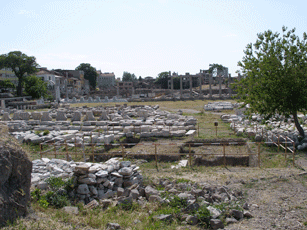Latin Was NOT the Language of the Original Catholic Church

Ancient Smyrna was Greek
In its latest weekly update, LCG had the following news item:
The Pope Moves “Back to the Future.” Nearly 40 years ago, the Catholic Church effectively banned the Latin Mass to make people feel more a part of the liturgy. In recent years, the Pope has made the Latin Mass an “option” for Catholic parishes. Now, the Latin Mass “is to be reintroduced into every Roman Catholic parish….” When asked if the Latin Mass would be celebrated in many parishes in the future, the Pope’s senior spokesman stated, “Not in many parishes, all parishes.” This move will achieve the Pope’s wish for the Latin Mass and the “revised” (modern-language) Mass to exist side by side (Sunday Telegraph, June 15, 2008). But how long will it be before the Latin Mass totally replaces the “side-by-side” Mass? The current Pope Benedict XVI is focused on returning the Catholic Church to a more conservative time—a time when the Pope had greater power and influence over the church as a whole, and Europe in general. The Scriptures reveal that at the time of the end harlot daughters will return to their mother church. In addition, this church will grow in power and influence on the world scene (see Revelation 17). The Pope and his Vatican counselors are preparing the Roman church for a much greater role in the future (v. 18). Reinstituting the Latin Mass will force people to worship under the church’s power, while they are kept ignorant by not understanding the church’s teachings.
And while all of that is true, I would like to point out that the original “catholic church” was the Church of God in Smyrna. And the type of writings and church services that came from that area were NOT in Latin, but were in Greek. And that was also true for the Church of Rome–until probably the third century, pretty much all theological literature for the first and second centuries was in Greek.
Tertullian is called “the father of Latin theology”–yet he lived in North Africa (not Rome) and began to write just prior to and later into the third century.
The New Testament itself was written in koine Greek.
Thus Catholics who feel that they need to go back to the traditional language of the church would pick Greek, instead of Latin. Catholics and many others who are looking for the original church really need to review church history more than they have.
Several articles of possibly related interest may include:
What Do Roman Catholic Scholars Actually Teach About Early Church History? Although most believe that the Roman Catholic Church history teaches an unbroken line of succession of bishops beginning with Peter, with stories about most of them, Roman Catholic scholars know the truth of this matter. This eye-opening article is a must-read for any who really wants to know what Roman Catholic history actually admits about the early church.
Location of the Early Church: Another Look at Ephesus, Smyrna, and Rome What actually happened to the primitive Church? And did the Bible tell about this in advance?
Apostolic Succession What really happened? Did structure and beliefs change? Are many of the widely-held current understandings of this even possible? Did you know that Catholic scholars really do not believe that several of the claimed “apostolic sees” of the Orthodox have apostolic succession–despite the fact that the current pontiff himself seems to wish to ignore this view? Is there actually a true church that has ties to any of the apostles that is not part of the Catholic or Orthodox churches? Read this article if you truly are interested in the truth on this matter!
The Smyrna Church Era was predominant circa 135 A.D. to circa 450 A.D. The Church led by Polycarp, Melito, Polycrates, etc.
Polycarp of Smyrna: The Heretic Fighter Polycarp was the successor of the Apostle John and a major leader in Asia Minor. Do you know much about what he taught?
Which Is Faithful: The Roman Catholic Church or the Living Church of God? Do you know that both groups shared a lot of the earliest teachings? Do you know which church changed? Do you know which group is most faithful to the teachings of the apostolic church? Which group best represents true Christianity? This documented article answers those questions.
Hope of Salvation: How the Living Church of God differ from most Protestants How the Living Church of God differs from mainstream/traditional Protestants, is perhaps the question I am asked most by those without a Church of God background.
There are Many COGs: Why Support the Living Church of God? This is an article for those who wish to more easily sort out the different COGs. It really should be a MUST READ for current and former WCG members or any interested in supporting the faithful church. It also explains a lot of what the COGs are all about.
 |
Tweet |
|